Neighbourhood Watch: Ghani admin shuddered by spate of Taliban attacks
Analysts cite signing of controversial bilateral security agreement as reason for increase in violence
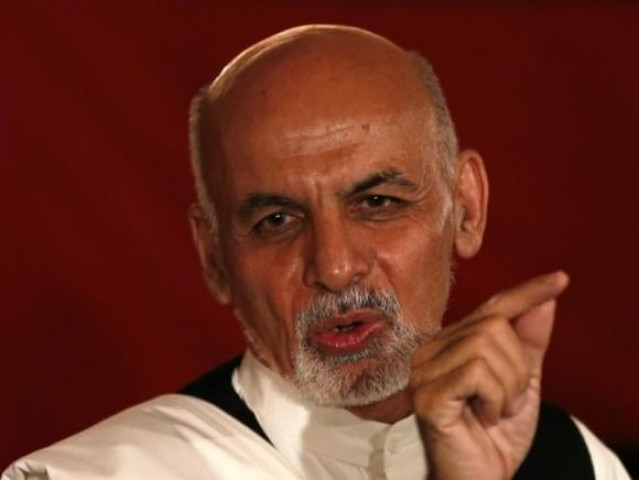
Since President Ashraf Ghani assumed charge of his office two months ago, militant attacks in the heart of high security zones of the city have raised questions over the capabilities of the incumbent government and the Afghan forces who have now taken charge of national security. The attacks, especially in sensitive locations like the two in the heart of the Afghan capital on Thursday, have put the limelight on the Afghan security forces.
Militant blitz
Taliban bombed a British embassy vehicle on Thursday morning, killing a British official and an Afghan staffer, while three others were also killed and dozens injured.
Hours later, the outfit targeted a guest house for foreigners in the high security Wazir Akbar Khan diplomatic enclave. A foreigner was injured in the attack, officials said.
Taliban claimed responsibility for the attacks. Their spokesperson Zabihullah Mujahid also claimed credit for three bombers engaging Afghan security forces in a five-hour-long gunfight.
They were clearly not done with rattling the edifice of the government for the day. In a third attack, a group of heavily-armed Taliban militants stormed an important Afghan military base, Camp Bastion, previously manned by the British military in southern Helmand. Officials claimed security forces terminated all four assailants. Taliban spokesperson Qari Yousaf, however, claimed they killed 280 foreign and Afghan troops and destroyed over 400 tanks in the attack.
Tracing the roots
According to Afghan media reports, Taliban have carried out 13 suicide bombings in the capital alone since the Ghani administration took over on September 29. Reports suggest the concentration on Kabul is to attract world attention and dent the president’s course of policy.
Security commentators, however, fail to agree that the attacks were carried out without support from within the ranks of the Afghan establishment. It is claimed that elements within the government machinery are unhappy at the prolonged military roles of the US and Nato as agreed upon in the recent security pacts.
Nazar Mutmaeen, a keen observer of the militancy, links the spate of attacks with the signing of the Bilateral Security Pact. “I think the security agreement is the reason for the increase in attacks. The Taliban want to prove their might to the foreigners,” Mutmaeen told The Express Tribune over the phone on Friday.
Mutmaeen maintained that the Taliban were expecting President Ghani to cast aside the policies of his predecessor but they are disappointed as he did not fulfil his pledge of reconciliation.
Security pacts
The Afghan senate approved two security agreements with the Nato and US with a clear majority on Thursday after national security adviser Hanif Atmar briefed the house about the pacts. A total of 65 out of the 72 present lawmakers voted in favour. The National Assembly had already approved the documents on November 23.
For President Ghani, peacemaking would certainly not be an easy task as his Chief Executive Dr Abdullah Abdullah is of a different viewpoint in tackling the hard line organisation, primarily because of his bitter past with Taliban. Abdullah opposed releasing Taliban detainees in Afghan jails on Thursday, as he believes “such a move would help the militants strengthen their ranks”.
Power sharing
In the backdrop of grave security challenges, wrangling within the ranks of the national unity government remains unresolved. After the passage of the 45-day deadline for the formation of the federal cabinet, leaders are now publicly identifying a visible rift between Ghani and Abdullah’s teams over the distribution of ministries and other key positions.
The first vice-president Abdul Rashid Dostam said that the idea of equal distribution of ministries between the two sides equates to two swords in one scabbard, which is unnatural and unacceptable.
“We have heard Dr Abdullah’s call for an equal distribution of power. The idea is impractical because this would mean two parallel governments and two presidents,” the Uzbek warlord told BBC Persian television this week. He also said that Taliban have taken advantage of differences in the coalition government.
Blame game
The traditional anti-Pakistan rhetoric has subsided to a certain extent with President Ghani’s arrival, however, the Afghan intelligence’s failure towards stemming Taliban infiltration along with the usual blame game appears to undermine the goodwill.
Bilal Sarwary, a senior Afghan journalist, quoted Kabul police chief General Zahir on Friday saying that the “explosives used in the in suicide attacks for the past two weeks are military grade, used by Pakistani forces”.
A few days earlier, Afghan senate chairman Abdul Hadi passed derogatory remarks against Pakistan after a suicide attack killed nearly 60 people in a volleyball match in Paktika. The Taliban denied involvement in the attack and vowed to punish the perpetrators. Meanwhile, the Afghan spy agency blamed the Haqqani Network (which is said to have cordial relations with Pakistan) for the attack.
Published in The Express Tribune, November 29th, 2014.


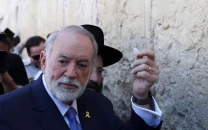
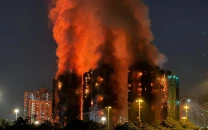
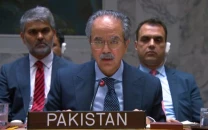
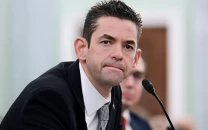
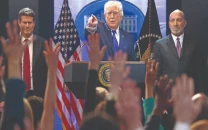











COMMENTS
Comments are moderated and generally will be posted if they are on-topic and not abusive.
For more information, please see our Comments FAQ